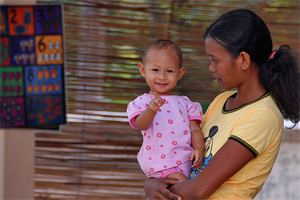By Thoraya Obaid
Executive Director,
United Nations Population Fund (UNFPA)
This Mother's Day women will be showered with flowers, cards and other expressions of love and affection. Mother's Day helps us to focus on the lifeline that women extend to us. But for too many women this lifeline is cut short when they die during pregnancy or childbirth.
This Mother's Day, and every other day of the year, some 1,400 women and adolescent girls will die needlessly from the most natural act of giving birth – one every minute. In every generation, ten million mothers die, leaving ten million families bereft. Nearly all of these women die in developing countries. Many die giving birth or shortly after – and everyone is the poorer for it.
Here in Australia, "dying in childbirth" occurs rarely and when it does it sends shockwaves through the entire family and circle of friends. But for women in most poor countries, pregnancy and childbirth are the leading causes of death and disability. In Africa, one woman in every 26 risks dying of maternal causes compared to Australia where it is one in 25,000 women. Every day, five Papua New Guinean women die as a result of pregnancy or childbirth.
We are so used to the idea that mothers are strong, resourceful and ever-present that we tend to take them for granted. We forget that mothers need support too.
Today some 300 million women are suffering from illness and injuries that they incurred during pregnancy and childbirth. Maternal mortality is one of the greatest health inequities in the world. It does not have to be this way. Given the knowledge, technology and wealth that we possess in the 21st century, we should be able to close the gap between rich and poor to ensure safe motherhood.
In 2000, leaders from 189 states adopted the United Nations Millennium Declaration, setting out a series of time-bound targets to improve the well-being of people and our planet, that have become known as the Millennium Development Goals (MDGs). However, ten years later MDG 5, to improve maternal health, is lagging behind.
What would it take to make every pregnancy wanted and every child birth safe? What would it take to give mothers worldwide the protection that they deserve and need? It is not rocket science. We are talking about access to contraceptives and family planning, skilled birth attendance and - if things go wrong - emergency obstetric care, safe blood, antibiotics, and a caesarean section. These simple things which we take for granted here in Australia, could save hundreds of thousands of lives every year.
The Australian Government continues to support efforts by UNFPA, the United Nations Population Fund, to attain the Millennium Development Goals, and is working with the Fund and other partners towards improving women's and children's health worldwide.
UNFPA is a key agency working to address maternal health, and from 2009 until 2012 Australia is providing UNFPA with $42.5 million to help advance their work. This work is critical if we are to reduce the number of poor mothers and their newborn babies who die needlessly each year through unsafe childbirth, including in Australia's immediate neighbourhood.
Improving the health of mothers requires a concerted world-wide effort. It is up to us all.
Let's use the occasion of Mother's Day to celebrate the health and life of the women we love. And let's raise our voices for the women and mothers who risk their lives during pregnancy and childbirth and call for greater investment in them.
More information
Gender Equality and Development
UNFPA [external website]

